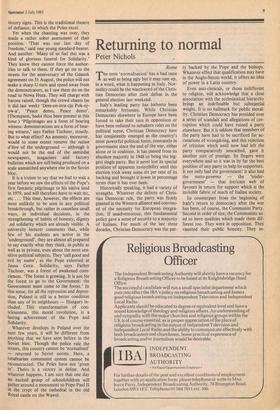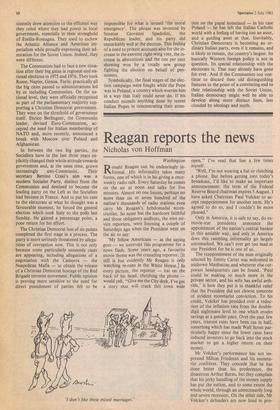Returning to normal
Peter Nichols
Rome 'The term 'normalisation' has a bad taste as well as being ugly but it may sum up, in a word, what is happening in Italy. Nor- mality could be the watchword of the Chris- tian Democrats after their defeat in the general election last weekend.
Italy's leading party has hitherto been remarkably fortunate. While Christian Democrats elsewhere in Europe have been forced to take their turn in opposition or have been reduced to subaltern roles on the political scene, Christian Democracy here has consistently emerged as the country's most powerful political force, constantly in government since the end of the war, either alone or in coalition. It has passed from its absolute majority in 1948 to being the big- gest single party. But it never lost its special position of apparent invincibility until this election took away some six per cent of its backing and brought it lower in percentage terms than it has ever been.
Historically speaking, it had a variety of strengths. Whatever the defects of Chris- tian Democrat rule, the party was firmly planted in the Western alliance and convinc- ed of the necessity for European integra- tion. If unadventurous, this fundamental policy gave a sense of security to a majority of Italians. For much of the last three decades, Christian Democracy was the par-
ty backed by the Pope and the bishops. Whatever effect that qualification may have in the Anglo-Saxon world, it offers an idea of power in a Latin country.
Even anti-clericals, or those indifferent to religion, will acknowledge that a close association, with the ecclesiastical hierarchy brings an indefinable but substantial weight. It is no hallmark for public moral- ity. Christian Democracy has presided over a series of scandals and allegations of cor- ruption which could have ruined a party elsewhere. But it is seldom that members of the party have had to be sacrificed for ac- cusations of wrongdoing, and this rejection of criticism which until now had left the party comparatively unscathed, gave it another sort of prestige. Its fingers were everywhere and so it was in by far the best position of any party to help its supporters. It not only had the government: it also had the sotto-governo — the 'under- government' — that intricate web of favours in return for support which is the invisible fabric of much of Italian society.
Its counterpart from the beginning of Italy's return to democracy after the war has been, of course, the Communist Party. Second in order of size, the Communists us- ed to have qualities which made them dif- ferent too. They were in opposition. They vaunted their public honesty. They in- sistently drew attention to the efficient way they ruled where they had power in local government, especially in their stronghold of Emilia-Romagna. They used to eschew the Atlantic Alliance and American im- perialism while proudly expressing their ad- miration for the Soviet Union. Indeed, they were different.
The Communists had to face a new situa- tion after their big gains in regional and na- tional elections in 1975 and 1976. They took Rome, Naples, Genoa, Turin: practically all the big cities passed to administrations led by or including Communists. On the na- tional level, they were officially recognised as part of the parliamentary majority sup- porting a Christian Democrat government. They were on the threshold of government itself. Enrico Berlinguer, the Communist leader, devised Euro-Communism, ac- cepted the need for Italian membership of NATO and, more recently, announced a break with Moscow over Poland and Afghanistan.
In between the two big parties, the Socialists have in the last three years ex- plicitly changed their whole attitude towards government and, at the same time, grown increasingly anti-Communist, Their secretary Bettino Craxi's aim was a modern Socialist Party, distinct from the Communists and destined to become the leading party on the Left as the Socialists had become in France. And to put his case to the electorate at what he thought was a favourable moment, he forced the general election which took Italy to the polls last Sunday. He gained a percentage point, a poor return for his effort.
The Christian Democrat loss of six points completed the first stage in a process. The party is more seriously threatened by allega- tions of corruption now. This is not only because some particularly unseemly cases are appearing, including allegations of a negotiation with the Camorra — the Neapolitan Mafia — to obtain the release of a Christian Democrat hostage of the Red Brigade terrorist movement. Public opinion is proving more sensitive to the need for direct punishment of parties felt to be responsible for what is termed 'the moral emergency'. The phrase was invented by Senator Giovanni Spadolini, the Republican leader, and his party did remarkably well at the election. This feeling of a need to protest accounts also for the in- crease in the extreme right-wing vote, the in- crease in abstentions and the one per cent showing won by a totally new group fighting the election on behalf of pen- sioners.
Symbolically, the final stages of the elec- tion campaign were fought while the Pope was in Poland, a country which worries him in a way that Italy could never do. If his conduct exceeds anything done by recent Italian Popes in concentrating their atten- tion on the papal homeland — in his case Poland — he has left the Italian Catholic world with a feeling of having lost an asset, and a guiding asset at that. Inevitably, Christian Democracy is becoming an or- dinary Italian party, even if it remains, and is likely to remain, the country's largest. Its basically Western foreign policy is not in question. Its special relationship with the electorate is. That may already have gone for ever. And if the Communists too con- tinue to discard their old distinguishing features to the point of a convincing end to their relationship with the Soviet Union, Italian democracy might well be able to develop along more distinct lines, less clouded by ideology and myth.







































 Previous page
Previous page